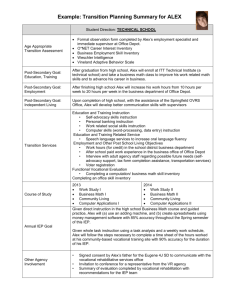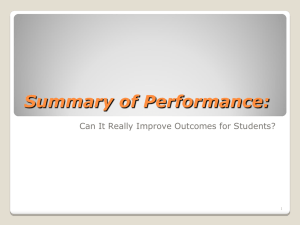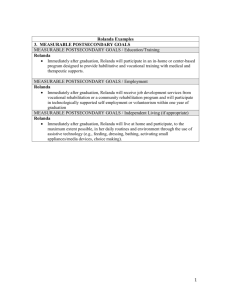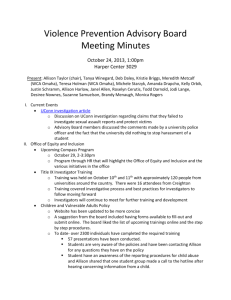summary of performance (sop) - Transition Community Network
advertisement
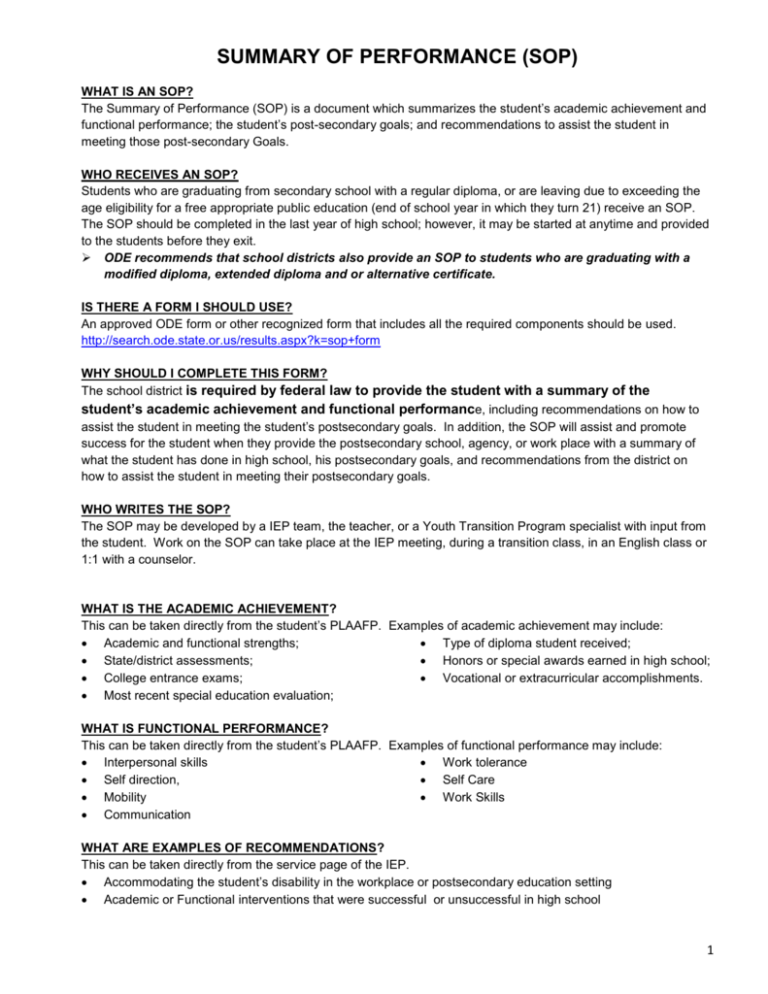
SUMMARY OF PERFORMANCE (SOP) WHAT IS AN SOP? The Summary of Performance (SOP) is a document which summarizes the student’s academic achievement and functional performance; the student’s post-secondary goals; and recommendations to assist the student in meeting those post-secondary Goals. WHO RECEIVES AN SOP? Students who are graduating from secondary school with a regular diploma, or are leaving due to exceeding the age eligibility for a free appropriate public education (end of school year in which they turn 21) receive an SOP. The SOP should be completed in the last year of high school; however, it may be started at anytime and provided to the students before they exit. ODE recommends that school districts also provide an SOP to students who are graduating with a modified diploma, extended diploma and or alternative certificate. IS THERE A FORM I SHOULD USE? An approved ODE form or other recognized form that includes all the required components should be used. http://search.ode.state.or.us/results.aspx?k=sop+form WHY SHOULD I COMPLETE THIS FORM? The school district is required by federal law to provide the student with a summary of the student’s academic achievement and functional performance, including recommendations on how to assist the student in meeting the student’s postsecondary goals. In addition, the SOP will assist and promote success for the student when they provide the postsecondary school, agency, or work place with a summary of what the student has done in high school, his postsecondary goals, and recommendations from the district on how to assist the student in meeting their postsecondary goals. WHO WRITES THE SOP? The SOP may be developed by a IEP team, the teacher, or a Youth Transition Program specialist with input from the student. Work on the SOP can take place at the IEP meeting, during a transition class, in an English class or 1:1 with a counselor. WHAT IS THE ACADEMIC ACHIEVEMENT? This can be taken directly from the student’s PLAAFP. Examples of academic achievement may include: Academic and functional strengths; Type of diploma student received; State/district assessments; Honors or special awards earned in high school; College entrance exams; Vocational or extracurricular accomplishments. Most recent special education evaluation; WHAT IS FUNCTIONAL PERFORMANCE? This can be taken directly from the student’s PLAAFP. Examples of functional performance may include: Interpersonal skills Work tolerance Self direction, Self Care Mobility Work Skills Communication WHAT ARE EXAMPLES OF RECOMMENDATIONS? This can be taken directly from the service page of the IEP. Accommodating the student’s disability in the workplace or postsecondary education setting Academic or Functional interventions that were successful or unsuccessful in high school 1 EXAMPLE OF SOP FOR ALEX Summary of Performance Student Name__Alex Jones_______ ID#___304236____ Birth Date______4/10/1996______ Attending School___Mid-County High School___ Student Case Manager___Jory Hamish__________________ Anticipated Exit Date__06/2014_______(mm/yy) Summary of Student’s Academic Achievement and Functional Performance: Alex is a 17 year old student with autism. He receives special education services in a Eugene area high school. At school, Alex receives instruction both in the classroom and in the community to improve his vocational, academic, and social skills. He is working toward a modified diploma. He is currently participating in community-based training in an office setting completing tasks such as data entry and spreadsheet development. Alex reads grade level texts independently; however, he demonstrates deficits in reading comprehension and oral expression. In elementary and middle school, he participated in general education math course and maintained a B average. In high school, he received two years of Tech Math, opting out of standard courses of Algebra I, II, and Geometry. After school, Alex works part-time at Office Depot entering numerical data to keep track of stock and services rendered by store staff. Student’s Post-Secondary Goals: Education and Training After graduation from high school, Alex will enroll at ITT Technical Institute (a technical school and take a business math class to improve his work related math skills and to advance his career in business. Employment After finishing high school Alex will increase his work hours from 10 hours per week to 20 hours per week in the business department of a local office supply store with temporary supports provided through Vocational Rehabilitation. Independent Living Upon completion of high school, with the assistance of the Springfield OVRS Office, Alex will develop better communication skills with supervisors. Recommendations to Assist Student in Meeting Post-Secondary Goals: Contact should be made at the Springfield OVRS Office to determine Alex’s Counselor. That person should be in close contact with the place of business. Communication: Alex knows that at times his speech is not understood by people he does not know, so sometimes he avoids talking to people he does not know well. One person in authority should be designated his “friend” so that he can communicate freely with that person, especially about issues of safety. Self- direction: He is diligent and methodical in completing the varied tasks assigned to him. Work Skills: His behavior is appropriate at work and he has expressed that he likes working. He is punctual each day, and he is willing to stay late when needed. Alex is detail-oriented and reviews each column of numbers several times before moving on to type another column. This results in slower production rates in comparison to other workers who complete similar tasks. Interpersonal Skills: Alex may be intimidated by people in authority because he knows that they have the ability to fire him, a fact that his teachers at school presented during a unit about behavior in the workplace. Alex has perseverated on this fact, making him afraid to talk to people in authority. Alex should be encouraged to have good communication with people in authority and he should be assured that his job is not easily in jeopardy. Name/Title:___Sara Whittington/Case Manager___________ Phone:____541-123-4567____________ School:______Mid-County High School__________________ Date:______4/17/2014_______________ 2 EXAMPLE OF SOP FOR ROLANDA Summary of Performance Student Name__Rolanda Smith_______ Birth Date______2/4/1995_____ Attending School___East End High School___ Student ID#___266557____ Case Manager___Anne Jackson__________________ Anticipated Exit Date__06/2014_______(mm/yy) Summary of Student’s Academic Achievement and Functional Performance: Rolanda is an 18 year old student with multiple disabilities. She is a non-ambulatory teenager with a profound cognitive disability. Rolanda is a friendly, alert student who is responsive to music. Her family will take her most places, as long as no food is served there, because Rolanda gets upset when others eat around her. Rolanda’s parents plan is that Rolanda will live with them for approximately 20 years. At that point they will seek supported housing in a group home, or with a relative who is willing to care for her. Her parents are willing to implement a program that will benefit Rolanda at home, yet they are concerned that she could benefit from technology that they do not have the skills to utilize effectively. They also feel that it is important that Rolanda spend her days working to the best of her ability so that she gains skills and feel a sense of accomplishment. Student’s Post-Secondary Goals: Education and Training After graduation, Rolanda will participate in an in-home or center-based program designed to provide habilitative and vocational training with medical and therapeutic supports. Employment Immediately after graduation, Rolanda will receive job development services from vocational rehabilitation or a community rehabilitation program and will participate in technologically supported self-employment or volunteer work within 1 year of graduation. Independent Living After graduation Rolanda will participate in community-integrated recreational/leisure activities related to music, movies, and art at movie theaters, concerts at the local community college, art and craft museums downtown, and the entertainment store at the mall. Recommendations to Assist Student in Meeting Post-Secondary Goals: Contact should be made at the OVRS Office to determine Rolanda’s Counselor. Contact should also be made with Community Pathways, Inc to determine her brokerage contract. Mobility: Rolanda has athetoid cerebral palsy that impacts all motoric functioning Self Care: Until the age of 12, Rolanda ate soft and pureed foods in small amounts several times a day. Due to choking concerns that scared her parents and teachers, doctors decided that it was necessary at that point for Rolanda to gain nutrition through a g-tube that another person connects to a source of nutritional liquid. Currently, Rolanda breathes with the assistance of a ventilator through her tracheotomy. Although her parents are young and strong right now, it is still important to them that Rolanda provides as much assistance as possible in self-care tasks such as transferring from her wheelchair to the floor, the bed, and to other adaptive furniture throughout the house as well as hygiene tasks. Communication: She communicates desires and needs inconsistently through switches and picture symbols. Social Security Income: Rolanda’s parents would also like additional information about financial planning and social security income to help them make informed decisions about Rolanda’s security in the future. Name/Title:___Freda Krause/Case Manager___________ Phone:____503-123-4567____________ School:______East End High School__________________ Date:______3/16/2014_______________ 3 EXAMPLE OF SOP FOR ALLISON Summary of Performance Student Name__Allison Everett_______ Birth Date______1/30/1995_____ Attending School___East End High School___ Student ID#___994662____ Case Manager___Anne Jackson__________________ Anticipated Exit Date__06/2014_______(mm/yy) Summary of Student’s Academic Achievement and Functional Performance: Allison is an 18 year old student with a specific learning disability in reading comprehension and written expression. She is a friendly student who has several friends and interests outside of school. Allison’s oral expression skills are strengths for her as are her interpersonal skills. Academically she has maintained B’s with a C in Chemistry during her 10th and first half of 11th grade school years. Allison’s older sister graduated from college and is finishing up her first year teaching first grade at an elementary school.. Allison likes to go to her sister’s classroom after school and on the weekends to help her sister make materials for lessons. Allison decided that she wants work with pre-schoolers or kindergarteners, but she is not sure if she wants to be classroom teacher. Allison’s parents are concerned that she does not have the organizational skills to effectively manage her study time as well as her social life. Allison has told her friends about her disability status. She views her disability as a challenge, and she realizes that her organizational skills could be a barrier to achieving her goals. She has committed herself to making changes to become more organized. Student’s Post-Secondary Goals: Education and Training After graduation from high school, Allison will attend Eastern Oregon University and take coursework leading to a major in the area of Child Development. Employment After graduation from college, Allison will become an early childhood education teacher in Pendleton School District. Independent Living Upon entrance to Eastern Oregon University, Allison will access EOU Disability Services for assistance in notetaking and study partners. Recommendations to Assist Student in Meeting Post-Secondary Goals: Contact should be made at the Eastern Oregon University Disability Services Office. Disability Services: Allison has a specific learning disability in reading comprehension and written expression. Allison’s oral expression skills are strengths for her as are her interpersonal skills. Academically she has maintained B’s with a C in Chemistry during her 10th and first half of 11th grade school years. Allison’s teachers have suggested that Allison meet with a counselor and a representative from disability services on campus prior to the first semester to ensure that her college coursework is well-planned and that she has support to make decisions about her courses and to assist her in organization. Name/Title:___Sam Tulley/Case Manager___________ Phone:____541-987-6543____________ School:______East End High School__________________ Date:______3/16/2014_______________ 4
